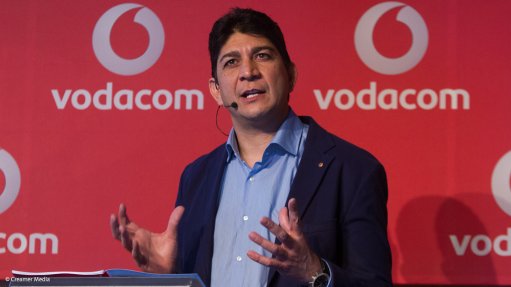
Vodacom CEO Shameel Joosub
While the #datamustfall movement is calling for lower data prices, telecommunications giant Vodacom CEO Shameel Joosub says there is only so much an operator can do to comply with demands without high-demand spectrum.
Speaking at the yearly MyBroadband Conference, which took place in Midrand, on Thursday, Joosub highlighted the dire shortage of high-demand spectrum that would allow South African operators to accelerate the deployment of faster technologies and keep up with the pace of the data explosion currently under way in the country.
While the price of data has decreased some 65% over the past few years, the lack of spectrum is preventing further drops, as mobile operators have to inject more funds to ensure that the current – and insufficient – infrastructure copes with the 45% a year-plus growth in data demand.
Vodacom has invested some R26-billion in infrastructure over the past two years, a large portion of which was used to build more base stations, closer together. This proved an expensive endeavour that could have been eliminated through the use of high-demand 700 MHz, 800 MHz and 2 600 MHz spectrum, which has a far-reaching range. In addition, the telecoms giant used the money to invest in other initiatives to leverage what was available, such as refarming current spectrum.
“Data must fall, spectrum must come,” Joosub quipped, indicating that operators were spending extensively just to cope without spectrum.
“We have a big problem in South Africa,” he said of the spectrum debate, which has been ongoing for the better part of a decade, referring in particular to the spectrum being held by broadcasters, as they transition from an analogue frequency to a digital platform.
A year ago, South Africa missed the June 17, 2015, International Telecommunication Union- (ITU-) stipulated deadline to switch over from analogue television to digital terrestrial television (DTT) signals, after which the digital spectrum to be used by the broadcasters was meant to be released.
However, the migration process is still under way, delayed yet again owing to disagreements between stakeholders over the encryption on the set-top boxes required to connect to the new digital broadcast.
Moreover, the Department of Telecommunications and Postal Services halted the auction process for the allocation of the much-needed spectrum. This, along with the uncertainties surrounding the new or implied directives in the recently released National Integrated Information and Communication Technologies (ICT) Policy White Paper, has placed added pressure on operators and subjected the industry to future uncertainty.
“If we don’t get that spectrum, there is very little that we can do,” Joosub warned, pointing out that the accelerated deployment of new, faster technologies was “really a matter of access to spectrum”.
While Vodacom invested extensively in its network to mitigate this challenge, the CEO has made it clear that there is a point where more cannot be done.